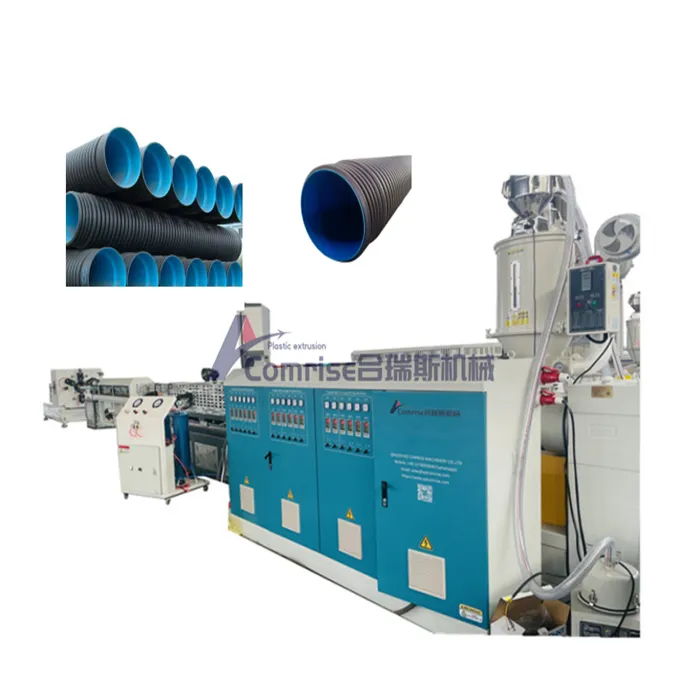Understanding HDPE Pipe Machines: The Backbone of Modern Piping Systems
2024-09-02
Introduction
In today's world, where infrastructure development is at the forefront of technological advancement, the demand for reliable and efficient piping solutions has never been higher. High-Density Polyethylene (HDPE) pipes have emerged as a popular choice due to their durability, flexibility, and resistance to corrosion. At the heart of the production of these pipes is the HDPE pipe machine. This blog post will provide an in-depth look at what HDPE pipe machines are, how they work, and why they are essential in the production of modern piping systems.

What is an HDPE Pipe Machine?
An HDPE pipe machine is a specialized piece of equipment used to produce HDPE pipes. These machines are designed to handle the extrusion process of HDPE material into pipes of various sizes and thicknesses. The process involves melting HDPE pellets and then extruding them through a die to form pipes. These pipes are then cooled and cut to the desired length, ready for use in various applications such as water supply, gas distribution, sewage systems, and industrial piping.
Components of an HDPE Pipe Machine
1. Extruder
- The extruder is the core component of the HDPE pipe machine. It is responsible for melting the HDPE pellets and pushing the molten material through the die. The extruder consists of a barrel and a screw, which rotates to generate heat and pressure, melting the HDPE pellets.
2. Die Head
- The die head shapes the molten HDPE into the form of a pipe. The design of the die head is crucial, as it determines the diameter and wall thickness of the pipe. Different die heads can be used to produce pipes of varying sizes and specifications.
3. Vacuum Calibration Tank
- Once the HDPE material exits the die head, it enters a vacuum calibration tank. This tank helps to shape and cool the pipe, ensuring that it maintains the correct dimensions and a smooth surface. The vacuum also removes any air bubbles that may have formed during the extrusion process.
4. Cooling System
- The cooling system further cools the pipe to ensure it retains its shape and structural integrity. Cooling is typically done using water, and the process may involve multiple cooling tanks to gradually lower the temperature of the pipe.
5. Haul-Off Unit
- The haul-off unit is responsible for pulling the pipe through the machine at a controlled speed. This ensures that the pipe is produced consistently and with the correct thickness and diameter.
6. Cutting Unit
- After cooling, the pipe is cut to the desired length using a cutting unit. This unit can be set to cut the pipe at specific intervals, depending on the requirements of the application.
7. Stacking Unit
- Finally, the finished pipes are collected and stacked using a stacking unit. This unit ensures that the pipes are neatly organized and ready for transportation or storage.
Advantages of HDPE Pipe Machines
1. Efficiency
- HDPE pipe machines are designed for high-speed production, allowing manufacturers to produce large quantities of pipes in a short period. This efficiency is crucial for meeting the high demand for HDPE pipes in various industries.
2. Versatility
- HDPE pipe machines can produce pipes of different sizes and thicknesses, making them suitable for a wide range of applications. From small-diameter pipes for domestic plumbing to large-diameter pipes for industrial use, HDPE pipe machines can handle it all.
3. Quality Control
- These machines are equipped with advanced technology that ensures the pipes produced are of high quality. Features such as vacuum calibration and cooling systems help maintain the structural integrity of the pipes, ensuring they meet industry standards.
4. Cost-Effectiveness
- HDPE pipe machines are designed to be energy-efficient, reducing the cost of production. Additionally, the durability of HDPE pipes means they require less maintenance, resulting in long-term cost savings.
Conclusion
HDPE pipe machines are a vital part of the modern piping industry, enabling the efficient and cost-effective production of high-quality HDPE pipes. With their advanced technology and versatility, these machines ensure that the pipes produced meet the stringent demands of various applications. As the demand for durable and reliable piping solutions continues to grow, HDPE pipe machines will play a crucial role in shaping the future of infrastructure development.


